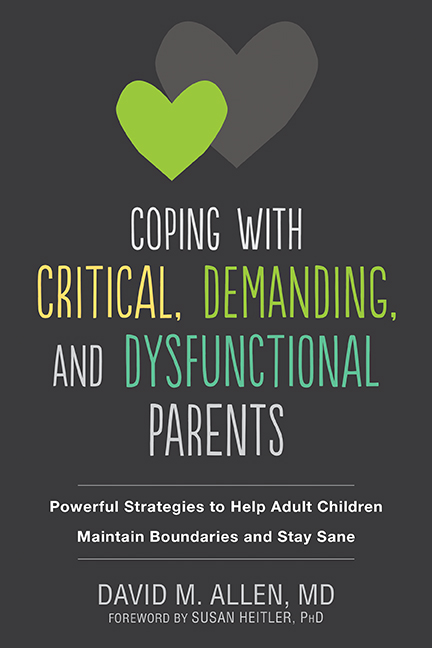By David M. Allen, MD, author of Coping with Critical, Demanding, and Dysfunctional Parents
In the movie Crazy Rich Asians, the male protagonist is torn between his perceived “duty” to his family in Singapore, who want him to take over the family business, and his wish to stay in America and marry a woman he’s fallen in love with. Many people in the US like to think of themselves as independent individuals who choose to live the way they want to without having to worry about such matters. Some can, but for a lot of us, that’s just not the case. Newspaper advice columns are filled with letters from adults afraid to defy disapproving parents, over matters ranging from where they spend their holidays to their choice of partners:
Dear Annie
January 17, 2018
“My issue is my sister and my mom. I have spent most of my adult life trying to please both of them.… The latest blowup was because I suggested a different Christmas game.”
Dear Abby
March 27, 2018
“I am an only child who has lived at home all her life—44 years. My father recently passed away, so now it is just Mom and me.…She is jealous of my friends and feels I must be with her for almost everything.”
Carolyn Hax
July 13, 2018
“I’m a 45-year-old single woman….I badly want to adopt.…Every time I bring this up to my parents, I am bombarded by all of the negative aspects of being a single parent….I fear that if I listen to my mother’s litany of reasons why I shouldn’t be a parent, I will never fulfill my dream.”
Evolutionary theory tells us that we are biologically programmed to follow life rules and mandates handed to us by our primary attachment figures, even if that means we have to give up on our personal hopes, dreams, and even beliefs. We come into the world helpless and stay that way for years, so we must learn how the world works from our families. Additionally, sticking together has survival value, so genes that have us stay together are more likely than “selfish” genes to be passed down to later generations (kin selection).
Nonetheless, as sentient beings capable of independent thought, we all have a “self” that can observe the world and decide not to follow certain family rules. Expressing ourselves independently is called self-actualization. Different families allow their children different degrees of freedom in this regard.
When our families are hard on us about our behavior, using a strong message of “You are wrong. Stop that and do what we expect,” they are an extremely powerful force, and we are likely to submit. Even so-called “oppositional” children often act that way out of the belief that their families expect them to be black sheep. Paradoxically, they are really cooperating. Even if the parents scold them, their actions say something else, and actions speak louder than words.
So, when forced to choose, how do we keep ourselves in line? Theorists have pointed to phenomena that answer this question, but they miss the mark in explaining the reasons behind them.
Psychoanalysts speak of defense mechanisms like projection and reaction formation. According to them, these defense mechanisms are meant to protect individuals from their anxiety about behavior, which runs counter to their own beliefs about right and wrong. If that is the purpose of defense mechanisms, then they do a poor job.
Cognitive behavioral therapists discuss how individuals think irrational thoughts such as worrying about unlikely worst-case scenarios or telling themselves that they must do or achieve something. Originally, when asked why people do this, therapists said that we are basically just born that way. Lately, they have come around to the idea that it has something to do with the way we were raised.
In my opinion, defense mechanisms and irrational thoughts serve an identical function: stopping ourselves from doing or believing things that our families will not accept. If you, say, worry that expressing any anger at all might lead you to lose control and murder people, you are scaring yourself out of expressing the way you really feel. Alternatively, if you keep your anger inside by compulsively playing the role of a frightened snowflake, you accomplish the same goal.
David M. Allen, MD, is professor emeritus of psychiatry and former director of psychiatric residency training at The University of Tennessee Health Science Center in Memphis, TN. He is author of the book How Dysfunctional Families Spur Mental Disorders. He has carried out research on personality disorders, is a psychotherapy theorist, and is former associate editor of the Journal of Psychotherapy Integration. He is also author of three books for psychotherapists, as well as numerous journal articles and book chapters.



 2024 Peace Playbook: 3 Tactics to Avoid Clashes with Your Partner
2024 Peace Playbook: 3 Tactics to Avoid Clashes with Your Partner